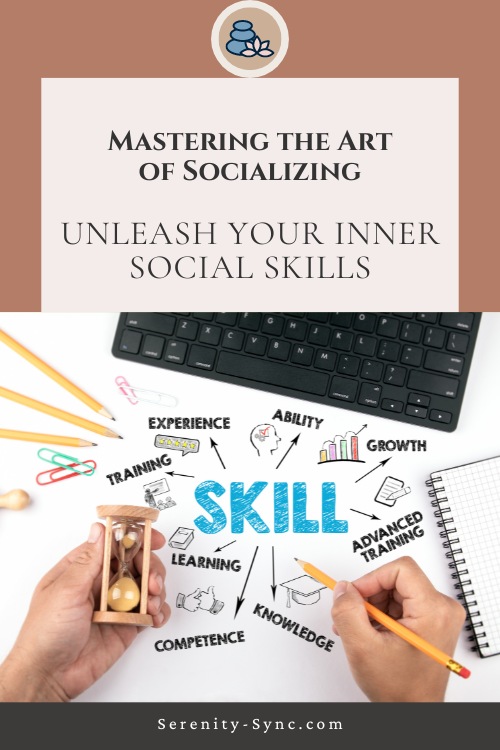In Brief
This blog post explores the world of social skills classes for adults, providing valuable insights and tips for those looking to improve their social interactions. From developing self-awareness to presenting oneself well, these classes offer comprehensive training to boost confidence and build meaningful connections. Discover the benefits of social skills training and unleash your inner social butterfly!

Your Free PDF version of this blog post Awaits – No Strings, Just Click and Enjoy! 🌸🎁![]()
Introduction: The Power of Social Skills Classes for Adults
Do you ever find yourself feeling awkward or unsure in social situations? Do you wish you could effortlessly navigate conversations and build meaningful connections? Well, you’re not alone! Many adults struggle with socializing, but the good news is that there are social skills classes specifically designed to help you overcome these challenges.
Whether you’re an introvert looking to step out of your comfort zone or an extrovert wanting to enhance your communication skills, social skills training can benefit individuals from all walks of life. These classes provide a safe and supportive environment to learn and practice essential social skills, equipping you with the tools you need to thrive in both personal and professional settings.
Developing Self-Awareness: Know Yourself First
Before you can effectively interact with others, it’s crucial to understand yourself. Self-awareness is the foundation of strong social skills, as it allows you to recognize your strengths, weaknesses, and areas for improvement. Social skills classes for adults often begin by helping participants develop self-awareness through various exercises and assessments.
One effective method is taking online personality tests, such as the Myers-Briggs Type Indicator (MBTI) or the Big Five Personality Traits assessment. These tests provide insights into your unique personality traits, allowing you to leverage your strengths and adapt your communication style to different situations. Understanding your own preferences and tendencies can greatly enhance your social interactions.
In addition to personality assessments, social skills classes also emphasize the importance of self-reflection. By regularly reflecting on your social interactions and behavior, you can identify areas for improvement and set goals for personal growth. This self-awareness not only helps you become more attuned to others’ needs but also boosts your confidence in social settings.
Improving Your Self-Image: Embrace Your Uniqueness
One of the key aspects of social skills training is building self-confidence and improving your self-image. Many adults struggle with negative self-perceptions, which can hinder their ability to engage with others. Social skills classes provide strategies and exercises to help you embrace your uniqueness and develop a positive self-image.
A common technique is to focus on your positive traits and accomplishments. By shifting your attention away from self-doubt and negative assumptions, you can build confidence in your abilities and present yourself more positively in social situations. Surrounding yourself with positive influences and supportive individuals can also contribute to a healthier self-image.
Additionally, practicing self-care is essential for maintaining a positive self-image. Engaging in activities that bring you joy and fulfillment, such as exercising, pursuing hobbies, or practicing mindfulness, can boost your overall well-being and self-confidence. When you feel good about yourself, it shows in your interactions with others.
Mastering the Art of Not Caring: Be Your Authentic Self
One of the most challenging aspects of socializing is overcoming the fear of judgment and embracing your authentic self. Social skills classes for adults aim to help individuals develop resilience and cultivate self-acceptance in order to navigate social situations with confidence.
It’s important to recognize that people’s opinions of you do not define your worth. By challenging the fear of judgment and embracing vulnerability, you can break free from the need for external validation. Being comfortable in your own skin and emphasizing personal growth over seeking approval from others can have a transformative effect on your social interactions.
Developing resilience is also crucial in mastering the art of not caring. Social setbacks and rejections are a natural part of life, but by learning from these experiences and bouncing back stronger, you can continue to grow and thrive socially. Social skills classes provide a supportive environment to practice resilience and develop strategies for overcoming obstacles.
Fun Fact
Did you know that social skills training can benefit not only your personal life but also your professional success? Studies have shown that individuals with strong social skills are more likely to excel in their careers and experience higher job satisfaction.
Presenting Yourself with Confidence – Making a Lasting Impression
When it comes to social interactions, first impressions count. To make a lasting impact, it’s essential to create a great first impression through body language, a positive demeanor, and appropriate attire. Active listening skills, empathy, and effective communication techniques are also crucial for engaging in meaningful conversations and connecting with others on a deeper level. In this section, we will explore how you can present yourself with confidence, leaving a lasting impression on those you meet.
Create a great first impression through body language and positive demeanor
Your body language speaks louder than words. It’s important to maintain an open posture, make eye contact, and offer a warm smile. Remember, positivity is contagious, so approach interactions with a friendly and upbeat attitude. By doing so, you’ll create a welcoming environment and leave a lasting impression on those you encounter.
Dress appropriately to boost self-confidence and leave a lasting impact
Choosing the right attire can significantly impact your self-confidence and how others perceive you. Dressing appropriately for each occasion shows respect and consideration. Whether it’s a formal event or a casual gathering, dressing well will boost your confidence, allowing you to make a lasting impression and stand out from the crowd.
Develop active listening skills to engage in meaningful conversations
Active listening involves fully focusing on the speaker, maintaining eye contact, and showing genuine interest in what they have to say. By actively listening, you demonstrate respect and create a space for meaningful conversations. This skill allows you to connect with others on a deeper level and fosters strong relationships.
Cultivate empathy and understanding to connect with others on a deeper level
Empathy is the ability to understand and share the feelings of others. By cultivating empathy, you can better relate to those around you and create meaningful connections. It involves putting yourself in someone else’s shoes and responding with kindness and understanding. Empathy helps build rapport and fosters positive relationships.
Utilize effective communication techniques to convey your thoughts clearly
Effective communication is essential for expressing your thoughts, ideas, and emotions clearly. It involves using concise language, active listening, and non-verbal cues. By mastering effective communication techniques, you can avoid misunderstandings, connect with others more effectively, and make a lasting impact during conversations.
Finding the Right Social Skills Program – A Step-by-Step Guide
While some individuals naturally excel in social settings, others may benefit from social skills programs. In this section, we will guide you through the process of finding the right program for your needs. From researching different programs and assessing compatibility to participating in tailored group sessions, we’ll help you unleash your social potential.
Research different social skills programs and their methodologies
Start by researching various social skills programs available. Look for programs that align with your goals and values. Take note of their methodologies and approaches to determine which one resonates with you. Understanding the different options will help you make an informed decision about the program that best suits your needs.
Consider program compatibility and verify its suitability for your needs
Compatibility is key when choosing a social skills program. Consider factors such as the program’s target audience, learning style, and overall approach. It’s important to ensure that the program aligns with your specific needs and preferences. Verify the program’s suitability by reading reviews, testimonials, or speaking with program coordinators.
Schedule an intake appointment to assess your social strengths and areas for improvement
An intake appointment is an opportunity to assess your social strengths and areas for improvement. During this appointment, a professional will evaluate your current skills and understand your specific goals. This assessment will help tailor the program to address your individual needs effectively.
Participate in group sessions tailored to your individual needs
Group sessions are a valuable component of social skills programs. These sessions allow you to practice and apply learned skills in a supportive environment. Look for programs that offer group sessions tailored to your individual needs. Engaging with peers who share similar goals can enhance your learning experience and provide a sense of community.
Seek personalized sessions or additional support if required
Every individual is unique, and some may require additional support beyond group sessions. If you feel the need for personalized attention or have specific challenges, consider seeking one-on-one sessions or additional support. Personalized sessions can address your specific concerns and provide targeted strategies to help you overcome social obstacles.
Conclusion – Unleashing Your Social Potential
Social skills training is a powerful tool for personal growth. By honing your social skills, you can unlock your true potential and build lasting relationships. Take that first step towards improving your social interactions and watch as the benefits unfold. Enhanced social skills can lead to increased self-awareness, improved self-image, and the ability to connect with others on a deeper level. Don’t let social anxiety hold you back—embrace the journey to becoming a social butterfly!
Mastering the art of social skills is within your reach. By presenting yourself with confidence, developing active listening skills, and cultivating empathy, you can connect with others on a deeper level and build lasting relationships. Remember, it’s never too late to enhance your social interactions. Take the first step towards personal growth by finding the right social skills program that suits your needs. Whether you choose group sessions or seek personalized support, unlocking your social potential will lead to a more fulfilling and meaningful life. So why wait? Embrace the journey and become the social butterfly you were meant to be!
Fun Fact
In Japan, social skills classes for adults have become a popular trend known as “enkai training.” These classes focus on teaching adults how to navigate business dinners, networking events, and other social gatherings with confidence and grace.

